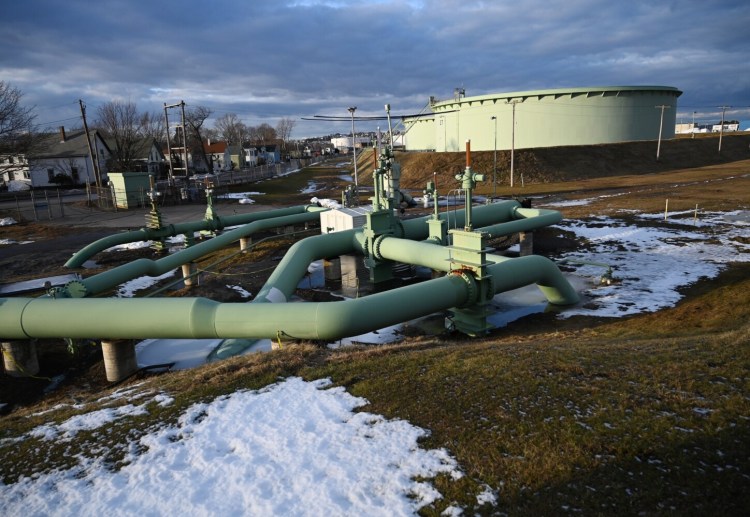Maine’s top state judges could decide the outcome of a nearly 5-year-old federal court battle between the city of South Portland and the Portland Pipe Line Corp.
The 1st U.S. Circuit Court of Appeals in Boston has asked the seven-member Maine Supreme Judicial Court to determine whether the city’s so-called Clear Skies Ordinance conflicts with state law.
It’s the latest twist in a long-running lawsuit that has cost the city more than $2.4 million in legal fees and drawn at least $173,603 in donations to its Clear Skies Legal Defense Fund.
The pipeline company filed a federal lawsuit in February 2015 challenging the ordinance, which effectively blocked the company from reversing the flow of its now-defunct pipeline from South Portland to Montreal and transporting crude oil from western Canada to its shipping terminals in Portland Harbor.
The South Portland City Council passed the ordinance in July 2014, anticipating a potential threat to local air quality if the company were allowed to load crude oil into tankers. The local action also was fueled by a global effort to limit Canada’s production of tar sands crude, which environmentalists say accelerates climate change.
The pipeline company contends that the ordinance is pre-empted by state and federal law, violates the Commerce Clause of the Constitution, and adversely impacts national and international oil trade. The constitutional clause gives Congress the power to regulate interstate and foreign trade.
In an order issued Friday, the three-member federal appeals court asked the Maine Law Court to determine whether the Clear Skies Ordinance violates the licensing authority of the Maine Department of Environmental Protection over petroleum facilities operating in coastal areas.
Under the state’s Coastal Conveyance Act, the Maine DEP issues licenses for petroleum companies operating where they pose a potential hazard to public and private recreation, fishing, lobstering and other marine life used for food and other commercial activities.
Lawyers for the pipeline company have argued that its operating license from the DEP is an “order” under state law that cannot be superseded by a municipal ordinance. Lawyers representing the city and the state have argued that the DEP license isn’t meant to pre-empt the city’s home-rule authority on zoning issues pertaining to the health and welfare of the municipality.
“We respectfully ask the Law Court to consider … whether interpreting ‘order’ to include MDEP licenses infringes upon ‘home rule’ authority reserved for the state’s municipalities,” the federal judges wrote in their order.
If the state court determines that the Clear Skies Ordinance violates state law, the ordinance would be struck down, the work of the federal appeals court would be finished and the city would have no recourse to appeal the decision. If the state court upholds the ordinance, the federal appeals court would then have to decide the lawsuit’s constitutional issues.
“We sidestep the federal quagmire for the moment,” the federal judges wrote, referring to well-established court doctrine to avoid deciding constitutional issues.
City Manager Scott Morelli issued a written statement Wednesday from the city’s attorneys: “The city looks forward to presenting its arguments to the court and anticipates that the court will agree with the city that the Clear Skies Ordinance was an appropriate exercise of local authority.”
It could be six months to a year before the Maine Law Court issues a decision, after requesting written briefs and responses, and possibly oral arguments, from attorneys for both sides.
Attorneys for the pipeline company didn’t respond to calls or emails requesting comment Wednesday and a spokesman for the company said it would have no comment.
The South Portland Planning Board approved a proposal to reverse the pipeline’s flow in 2009, when the city planner indicated in an email to a company representative that he had “no concerns” with the plan. The board extended the approval through 2012, but the company never started the project and by 2013 it was assuring the public there was no active plan to reverse the pipeline’s flow.
The pipeline has since largely ceased transporting oil to refineries in Montreal due to lack of demand for foreign crude.
The ordinance effectively prohibits the company from reviving its plan to reverse the flow so it can be used to export oil from Canada.
Legal costs related to the city’s Clear Skies defense date to July 2019. The city was unable to provide more recent totals on Wednesday.
Send questions/comments to the editors.





Success. Please wait for the page to reload. If the page does not reload within 5 seconds, please refresh the page.
Enter your email and password to access comments.
Hi, to comment on stories you must . This profile is in addition to your subscription and website login.
Already have a commenting profile? .
Invalid username/password.
Please check your email to confirm and complete your registration.
Only subscribers are eligible to post comments. Please subscribe or login first for digital access. Here’s why.
Use the form below to reset your password. When you've submitted your account email, we will send an email with a reset code.